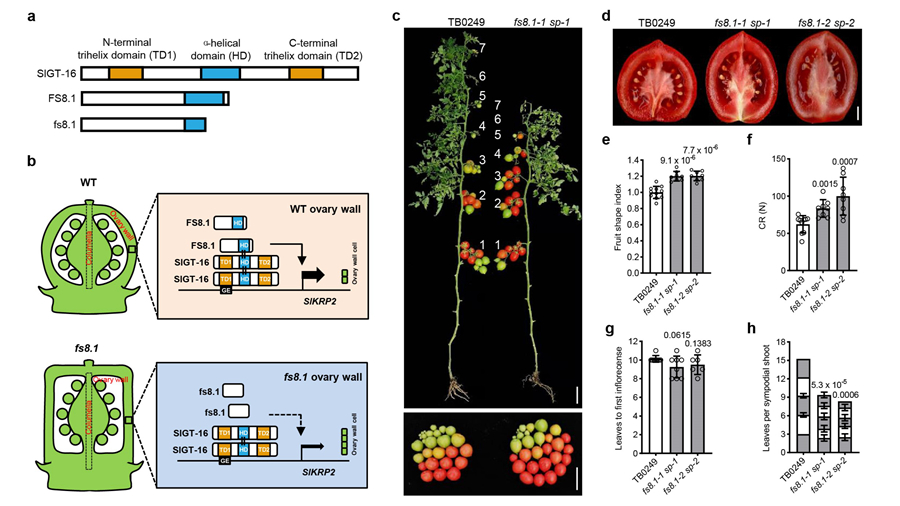According to a study published in
Nature Plants on Sept. 18, Chinese scientists have elucidated the mechanism of fruit shape formation in tomatoes and have developed fresh tomatoes for mechanical harvesting.
In the early 1960s, the fs8.1 mutation caused a shape change in tomato fruit from round to blocky, which greatly improved the stress tolerance of tomato fruit and brought about a major change in tomato processing from traditional manual harvesting to mechanized production. Since fs8.1 is located in a heterochromatic region, the underlying gene had not previously been identified.
Figure 1. Application of fs8.1 has facilitated mechanical harvesting of processing tomatoes (Image from Scott, 2014, Report of the Tomato Genetics Cooperative)
In this study, researchers led by Prof. LI Chuanyou from the Institute of Genetics and Developmental Biology (IGDB) of the Chinese Academy of Sciences reported the cloning, functional characterization, and breeding application of fs8.1.
They demonstrated that the fs8.1 mutation has a stronger promoting effect on cell proliferation in the ovary wall than in the columella, resulting in an elongated fruit shape. They then identified the FS8.1 gene and found that it encodes a non-canonical GT-2 factor that lacks the characteristic trihelix DNA-binding domain.
Further studies showed that FS8.1 activates the cell cycle inhibitor gene SlKRP2 by forming a transcriptional module with the canonical GT-2 factor SlGT-16. In wild-type (WT) ovaries, the expression levels of both FS8.1 and SlGT-16 are higher in the ovary walls than in the columella.
As a result, SlKRP2 expression is higher in the ovary walls than in the columella, resulting in round fruit. In fs8.1 mutant ovaries, however, FS8.1 is not functional. Thus, SlKRP2 expression is lower in the ovary walls than in the columella, resulting in elongated fruit.
Strikingly, fs8.1 was absent in fresh market varieties. Compared to the fruit of processing tomato, the fruit of fresh market tomato is of higher quality in terms of nutrition and flavor. However, fresh market tomato fruit may experience severe soft-fruit-related deterioration during harvest, transportation and storage. Natural ripening-related mutations have been used to improve fruit firmness. However, they often adversely affect color, flavor and nutritional quality. fs8.1 does not affect fruit ripening. Thus, cloning of FS8.1 offers a potential way to redesign fresh market tomatoes for mechanized production without compromising quality.
Indeed, knockout of FS8.1 in the fresh-market cultivar resulted in enhanced compression resistance. Importantly, this strategy does not affect key quality indexes of ripe fruit, including total soluble solid content and levels of sugars, acids and lycopene.
In addition, simultaneous mutation of FS8.1 and SP, which controls indeterminate growth of tomatoes, converted indeterminate fresh market tomato plants that produce round fruit into determinate plants that produce square fruit suitable for mechanical harvesting.
This study was funded by the National Key R&D Program of China and the National Natural Science Foundation of China.
Figure 2. Cloning, functional analysis and breeding application of fs8.1 (Image by IGDB)






